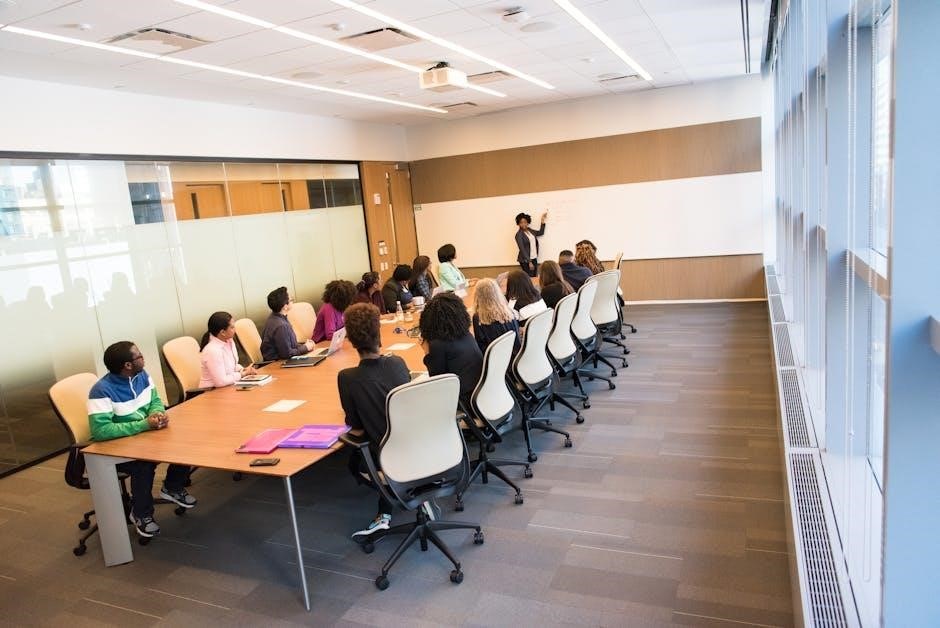Women’s conferences serve as platforms for empowerment, collaboration, and addressing key challenges․ They foster dialogue on leadership, health, and advocacy, inspiring collective action and personal growth;
1․1 Importance of Women’s Conferences
Women’s conferences are vital for fostering empowerment, leadership, and collaboration․ They provide platforms to address gender equality, health, and career development, inspiring women to overcome challenges․ These events promote networking, education, and advocacy, helping women achieve personal and professional growth․ By sharing experiences and strategies, conferences create a supportive environment for women to thrive and make meaningful contributions to society․ They also highlight the importance of unity and collective action in driving positive change globally․
1․2 History of Women’s Conferences
Women’s conferences have a rich history, dating back to early movements for gender equality․ The first International Women’s Conference in 1915 laid the groundwork for global advocacy․ Over the decades, these gatherings have evolved, addressing diverse topics like leadership, health, and rights․ Historical milestones include the 1975 Mexico City conference, which focused on women’s rights, and the 1995 Beijing Conference, setting a roadmap for gender equality․ These events have played a pivotal role in shaping policies and empowering women worldwide․

Leadership and Empowerment
Empowering women through leadership development is crucial․ Conferences offer strategies to break stereotypes and foster inclusive environments, enabling women to lead effectively across sectors․
2․1 Women in Leadership Roles
Women in leadership roles are pivotal in driving organizational success․ Conferences highlight their achievements, offering insights into overcoming challenges and strategies to advance in male-dominated industries․ These events provide platforms for sharing experiences and fostering mentorship, helping attendees navigate leadership landscapes effectively while promoting gender equality and inclusivity in the workplace․ By celebrating women leaders, conferences inspire the next generation to pursue executive roles with confidence and resilience․
2․2 Empowering Women in the Workplace
Empowering women in the workplace involves fostering inclusive environments, promoting gender equality, and providing resources for growth․ Conferences emphasize strategies like mentorship programs, diversity training, and policy reforms to address disparities․ Encouraging women to pursue leadership roles and advocating for equal pay are key themes․ By sharing success stories and practical tools, these events help women build confidence and navigate workplace challenges, ultimately driving organizational success and creating a more equitable professional landscape․
2․3 Breaking the Glass Ceiling
Breaking the glass ceiling requires dismantling systemic barriers that hinder women’s advancement․ Conferences highlight strategies like challenging biases, advocating for policy changes, and fostering sponsorship opportunities․ Panels often feature women who have overcome obstacles, sharing insights on resilience and innovation․ Addressing stereotypes and creating inclusive cultures are central themes․ By equipping women with tools to navigate and shatter these ceilings, conferences empower them to reach executive roles and drive organizational transformation․

Women’s Health and Well-being
Women’s health and well-being are critical topics, focusing on physical wellness, mental health awareness, and reproductive rights, ensuring holistic care and empowerment for women globally;
3․1 Physical Health and Wellness
Physical health and wellness are foundational to women’s overall well-being․ Women’s conferences often emphasize nutrition, exercise, and disease prevention, encouraging holistic lifestyles․ Workshops may address chronic illnesses, such as heart disease and diabetes, while promoting regular health screenings․ Discussions on menopause, reproductive health, and mental well-being are also common․ These conferences highlight the importance of self-care practices, stress management, and adequate sleep․ By fostering awareness and providing resources, they empower women to prioritize their health and maintain a balanced, vibrant life․
3․2 Mental Health Awareness
Mental health awareness is a critical focus at women’s conferences, addressing unique challenges women face, such as stress, anxiety, and societal pressures․ Workshops often explore coping strategies, mindfulness, and self-care․ Discussions highlight the impact of gender roles, work-life balance, and systemic inequalities on mental well-being․ These events emphasize the importance of seeking support and reducing stigma around mental health․ By fostering open conversations and providing resources, they empower women to prioritize their emotional and psychological well-being, promoting resilience and overall health․
3․3 Reproductive Health and Rights
Reproductive health and rights are central to women’s conferences, addressing access to healthcare, education, and autonomy․ Discussions focus on family planning, maternal care, and sexual health, emphasizing equity and bodily autonomy․ Panels explore barriers to reproductive services, especially for marginalized communities․ Advocacy for policy reforms and awareness campaigns are key themes․ These conversations empower women to make informed decisions about their health and futures, driving progress toward gender equality and reproductive justice globally;

Education and Career Development
Education and career development empower women to thrive professionally․ Conferences highlight access to resources, skill enhancement, and career pathways, fostering growth and success in diverse fields․
4․1 Women in STEM Fields
Women in STEM fields face unique challenges, including gender bias and underrepresentation․ Conferences highlight the importance of promoting diversity and inclusion to foster innovation․ Encouraging women to pursue STEM careers through mentorship and networking is crucial․ Discussions focus on breaking down barriers and creating opportunities for women to excel in science, technology, engineering, and mathematics․ Empowering women in STEM not only drives personal growth but also contributes to global progress and innovation․
4․2 Career Advancement Strategies
Women’s conferences often emphasize career advancement strategies tailored for women․ These include mentorship programs, leadership development workshops, and training in negotiation skills․ Such events provide insights into overcoming workplace challenges and advancing in male-dominated industries․ Networking opportunities allow women to connect with industry leaders and peers, fostering collaboration and support․ By addressing these areas, conferences empower women to navigate their careers effectively and achieve their professional goals․
4․3 Work-Life Balance for Women
Women’s conferences frequently address the challenge of achieving work-life balance․ Strategies include setting boundaries, prioritizing self-care, and leveraging flexible work arrangements․ Conferences often highlight the importance of mindfulness, time management, and creating a supportive environment at home and work․ These discussions empower women to maintain their well-being while excelling professionally, fostering a harmonious blend of personal and professional responsibilities․

Gender Equality and Advocacy
Gender equality and advocacy are crucial for promoting women’s rights and challenging stereotypes․ Conferences emphasize strategies to address discrimination and empower women through policy and education․
5․1 Achieving Gender Equality
Achieving gender equality requires systemic change and collective effort․ Conferences highlight strategies like policy reform, education, and workplace initiatives․ They emphasize the importance of dismantling biases and promoting equal opportunities․ By fostering dialogue and collaboration, these events inspire actionable steps toward a more equitable society, ensuring women’s voices are heard and valued․ The focus is on creating sustainable solutions to bridge the gender gap globally․
5․2 Combating Workplace Discrimination
Combating workplace discrimination involves fostering inclusive cultures and implementing anti-discrimination policies․ Conferences often discuss strategies like bias training, pay equity audits, and creating safe spaces for reporting issues․ Encouraging diversity in hiring and promotion helps reduce disparities․ Empowering women to advocate for their rights and supporting them through legal and organizational frameworks are key․ These efforts aim to create equitable environments where women thrive, free from bias and unfair treatment, ensuring their full participation and success in the workforce․
5․3 Advocacy for Women’s Rights
Advocacy for women’s rights focuses on promoting gender equality and challenging systemic inequities․ Conferences highlight key issues like pay equity, reproductive rights, and ending violence against women․ Strategies include grassroots movements, policy reform, and education to dismantle stereotypes․ Empowering women to assert their rights and supporting marginalized groups are central themes․ Collaboration between governments, organizations, and communities is essential to create lasting change and ensure women’s voices are heard and valued in all spheres of society․

Financial Literacy and Independence
Financial literacy empowers women to manage budgets, invest wisely, and build wealth․ Independence is achieved through entrepreneurship, smart money management, and understanding economic opportunities․
6․1 Financial Planning for Women
Financial planning is essential for women to achieve economic stability and independence․ It involves creating budgets, saving strategies, and retirement plans tailored to individual needs․ Understanding investment options, managing debt, and building credit are key components․ Women should also consider long-term financial goals, such as homeownership or education funds․ By prioritizing financial literacy, women can make informed decisions, reduce economic risks, and secure a prosperous future․ This empowers them to take control of their financial lives with confidence․
6․2 Entrepreneurship and Women-Owned Businesses
Entrepreneurship empowers women to create businesses that drive innovation and economic growth․ Women-owned businesses face unique challenges, such as accessing capital and balancing roles․ Conferences highlight success stories, providing insights into overcoming obstacles․ Mentorship programs and networking opportunities are vital for growth․ These businesses foster job creation and community development, showcasing women’s leadership in diverse industries․ Supporting women entrepreneurs is crucial for a thriving economy and gender equality, enabling them to turn ideas into impactful ventures․
6․3 Investing and Wealth Management
Investing and wealth management empower women to achieve financial independence․ Conferences highlight strategies for smart investing, retirement planning, and wealth growth․ Women often face unique challenges in accessing investment opportunities, but mentorship and education can bridge this gap․ Discussions focus on breaking down barriers, building financial literacy, and fostering confidence in managing wealth․ These sessions equip women with tools to secure their financial futures and create lasting legacies․
Technology and Innovation
Technology and innovation are driving forces for women’s empowerment․ Conferences explore digital literacy, tech career opportunities, and how innovation can address global challenges, fostering progress and equality․
7․1 Women in Technology
Women in technology are reshaping industries, breaking barriers, and driving innovation․ Conferences highlight their achievements, address gender gaps, and promote digital literacy․ They explore future trends like AI and STEM, fostering inclusive environments․ Encouraging women to pursue tech careers and supporting them through mentorship and networking are key themes․ These discussions empower women to lead in the digital age, ensuring they are integral to shaping the future of technology and innovation globally․
7․2 Innovation and Digital Literacy
Innovation and digital literacy are crucial for women’s empowerment in the modern world․ Conferences emphasize the importance of acquiring tech skills, fostering creativity, and leveraging digital tools․ These events explore how women can innovate in various sectors, from healthcare to education, using technology․ By enhancing digital literacy, women gain the confidence to thrive in a changing world, bridging the gap between traditional practices and cutting-edge advancements․ This focus ensures women are active participants in shaping the future through innovation․
7․3 Future Trends in Tech for Women
Future trends in tech for women highlight the growing importance of AI, data science, and cybersecurity․ Conferences explore how women can lead in emerging fields like quantum computing and blockchain․ Emphasis is placed on fostering STEM education and creating inclusive tech ecosystems․ These trends empower women to innovate and shape the digital future, ensuring they remain at the forefront of technological advancements and contribute to global progress․

Networking and Community Building
Women’s conferences emphasize building professional networks, fostering collaboration, and creating mentorship opportunities․ These efforts strengthen community support, empowering women to achieve personal and professional growth collectively․
8․1 Building Professional Networks
Building professional networks is a cornerstone of women’s conferences, fostering connections that empower individuals and organizations․ These events provide opportunities to meet like-minded professionals, share experiences, and gain insights․ Workshops and seminars often focus on networking strategies, while mentorship programs pair attendees with industry leaders․ Such interactions create lasting relationships, opening doors to collaboration and career advancement․ Strong networks not only enhance personal growth but also collectively strengthen women’s roles in various fields, driving societal progress and innovation․
8․2 Collaboration and Partnership
Collaboration and partnership are essential for fostering collective success among women․ By uniting individuals and organizations, these efforts drive innovation and problem-solving․ Strategic alliances and joint ventures enable women to pool resources, share knowledge, and amplify their impact․ Such partnerships not only enhance professional growth but also create a supportive ecosystem for women to thrive․ They play a pivotal role in addressing challenges and advancing gender equality, ensuring that collaborative efforts lead to lasting, transformative change across industries and communities․
8․3 Mentorship Programs for Women
Mentorship programs are vital for empowering women, offering guidance and support to navigate careers and personal growth․ These initiatives pair experienced professionals with mentees, fostering skill development and confidence․ Mentorship bridges knowledge gaps, provides networking opportunities, and helps women overcome challenges․ Programs often include workshops, one-on-one sessions, and peer support groups․ By fostering meaningful connections, mentorship empowers women to achieve their goals and become leaders in their fields, creating a lasting impact on their professional and personal lives․

Cultural and Societal Issues
Cultural and societal issues shape women’s experiences globally․ Topics include diversity, inclusion, body positivity, and media representation, fostering dialogue on equity and challenging stereotypes․
9․1 Cultural Diversity and Inclusion
Cultural diversity and inclusion are vital for fostering equitable societies․ Women’s conferences highlight the importance of embracing multicultural perspectives, addressing biases, and promoting inclusive practices․ By celebrating diverse backgrounds, these events encourage collaboration and mutual respect․ They also address challenges like stereotypes and discrimination, advocating for environments where all women thrive․ Inclusion fosters empowerment, innovation, and collective progress, ensuring that every voice is heard and valued in the global community․
9․2 Body Positivity and Self-Esteem
Body positivity and self-esteem are essential for women’s empowerment․ Women’s conferences emphasize accepting diverse body types and rejecting societal beauty standards; They foster self-love, resilience, and confidence, helping women overcome insecurities․ Discussions often address media influence, mental health, and the importance of self-acceptance․ By promoting positive body image, these events empower women to embrace their uniqueness and challenge stereotypes, fostering a culture of self-love and mutual support․
9․3 Media Representation of Women
Media representation of women is crucial for shaping perceptions and promoting gender equality․ Women’s conferences highlight the need for diverse and accurate portrayals, challenging stereotypes and biases; Discussions focus on how media influences self-esteem, career aspirations, and societal roles․ By advocating for inclusive storytelling, these events encourage industries to portray women in powerful, multidimensional roles, fostering a culture of respect and equality․ This shift helps break down barriers and empowers women to redefine their narratives․

Inspiration and Motivation
Women’s conferences inspire through success stories, overcoming challenges, and fostering personal growth․ They empower attendees to embrace their potential, pursue goals, and create meaningful impact in their lives and communities․
10․1 Success Stories of Women Leaders
Success stories of women leaders inspire and motivate attendees at conferences․ These narratives highlight journeys of resilience, innovation, and triumph, showcasing how women have shattered glass ceilings and transformed industries․ From entrepreneurs to policymakers, their achievements demonstrate the power of determination and vision․ Such stories not only celebrate individual accomplishments but also encourage others to pursue their goals with confidence and perseverance, creating a ripple effect of empowerment and change across generations and sectors․
10․2 Overcoming Obstacles and Challenges
Overcoming obstacles is a cornerstone of women’s conferences, where sharing experiences fosters resilience․ Common challenges include gender bias, discrimination, and work-life balance․ Strategies like mentorship, self-advocacy, and leveraging networks are often discussed․ These discussions empower women to navigate systemic barriers and thrive despite adversity, creating a supportive environment for collective growth and societal change․
10․3 Personal Growth and Development
Personal growth is a vital focus of women’s conferences, emphasizing self-awareness, skill development, and mindset shifts․ Workshops and sessions often explore topics like emotional intelligence, confidence-building, and goal-setting․ These initiatives help women identify their potential, embrace lifelong learning, and cultivate resilience․ By fostering personal development, conferences empower women to pursue their aspirations and contribute meaningfully to their communities, aligning with broader goals of gender equality and leadership․

Future Trends and Sustainability
Future women’s conferences will focus on sustainability, innovation, and global challenges․ These events will emphasize eco-friendly practices, technology integration, and collaborative solutions to drive long-term positive change․
11․1 Future of Women’s Conferences
The future of women’s conferences lies in embracing hybrid formats, integrating technology, and focusing on sustainability․ These events will prioritize inclusivity, diversity, and actionable outcomes, ensuring global participation and impactful discussions․ By leveraging digital tools, conferences can reach wider audiences and create lasting networks․ Sustainability will be a key theme, promoting eco-friendly practices and ethical considerations․ The goal is to foster innovation and collaboration, driving meaningful change for women worldwide while addressing emerging challenges effectively․
11․2 Sustainability and Women’s Roles
Women play a crucial role in advancing sustainability, driving eco-friendly practices, and promoting renewable energy․ Their leadership in community initiatives and policy-making fosters environmental stewardship․ Empowering women ensures equitable access to resources, enhancing global sustainability efforts․ By addressing gender disparities, women can fully contribute to climate solutions, ensuring a greener future for all․ Their involvement is vital for achieving sustainable development goals and creating resilient communities worldwide․
11․3 Global Challenges and Solutions
Women’s conferences address global challenges like gender inequality, economic disparities, and climate change․ By fostering collaboration, these events provide platforms for sharing solutions․ Investment in women’s empowerment and education is crucial for driving sustainable development․ Conferences highlight the importance of policy reform and innovation in tackling these issues․ They inspire collective action, equipping women with tools to overcome obstacles and create meaningful change on a global scale․
